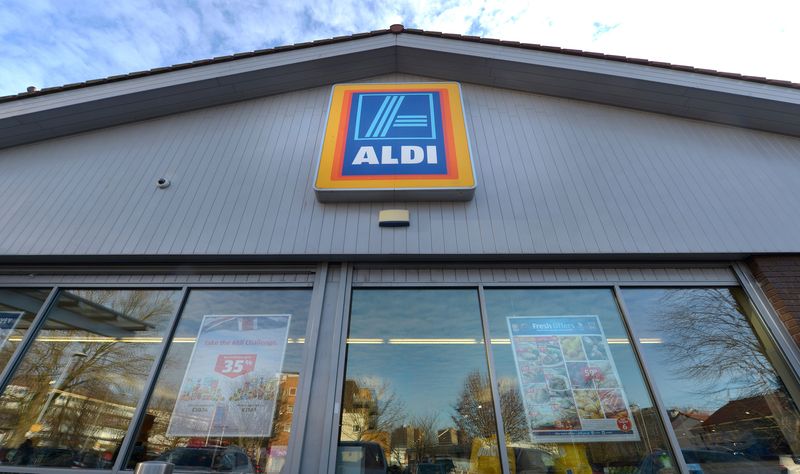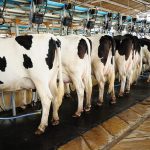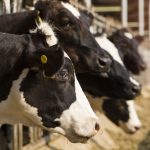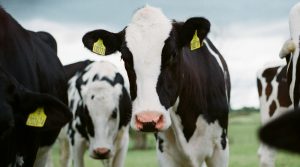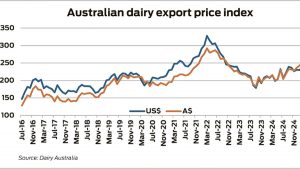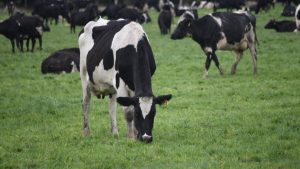
An extra 10 cents per litre will be added to the cost of Coles Brand and Farmdale fresh two and three litre varieties.
“Coles is currently paying dairy processors the highest farm gate milk prices in four years, without passing on the added expense to customers. However it is clear that many dairy farmers, particularly in New South Wales and Queensland, are struggling as a result of drought,” a spokesperson for Coles told 9News in a statement.
Aldi said their decision was made following “extensive discussion with key stakeholders in the dairy industry.”
Customers will see the price of two litres of Coles Brand milk rise $2.20, and three litre Coles Brand milk to $3.30 in most Coles supermarkets; all stores will see the price increase from today over the coming days.
The increases come months after Queensland dairy farmer Joe Bradley told Today that, without an added 10 cents per litre of milk bought, future generations of Australians will not have fresh milk available.
“I’m getting less for my milk now than I was in 2000. We had 26 dairy farmers in my local community here, I’m the only silly one left and I believe 10c a litre would go a long way to helping us survive,” he said at the time.
“That’s all we’re asking for – I don’t think it’s too much. Give us a fair go, help us survive, not only us, but to ensure that your kids and your grandkids will be able to drink milk in the future, because the way it’s going, it won’t happen – I can guarantee you, it won’t happen.”
Mr Bradley this morning applauded the move, but said he hopes the “interim measure” put in place by Coles does not mean it will be revoked in coming months.
“That’s what they did last time. This time, this has to be a permanent solution, the extra money on the milk has to stay there,” he said.
“It’s not just milk this has to go across the whole dairy cabinet because every farmer in Australia at the moment is absolutely struggling. Milk is getting that short in this country, by next year Australia is going to become a net importer of dairy products.”
The farmer from Dayboro, north-west of Brisbane, also told Today that the added 10 cents could equate to thousands of dollars to help struggling farmers.
“For the ordinary family who might buy 10 litres of milk a week, that’ll be an extra dollar that you’ll be paying,” he said.
“For a farmer like myself, I produce 150,000 litres of milk a month, that’s an extra $150,0900 a month to help me feed my cows. This is huge, but every farmer needs to get it and every farmer needs to get that to help them feed their cows.”
The announcement is a back-flip on the supermarkets’ decision last month to keep its milk at $1-a-litre milk.
At the time Federal Agricultural Minister David Littleproud savaged the move, dubbing it a “$1 milk disaster.”
“Publicity stunts like (Coles) asking shoppers to donate at the counter to help struggling farmers are just a smokescreen to hide the fact they pay bugger all for milk,” Mr Littleproud said.
“The farmers wouldn’t need donations from the public if Coles and Aldi paid fair prices.”
Dairy Connect, an advocacy group for dairy industry players, echoed that Mr Littleproud’s comments, urging consumers to force Coles and Aldi to change their ways.
Woolworths stopped selling its home-brand milk at $1 a litre in February, upping the price by 10 cents with the extra money to go back to farmers.
Mr Bradley also called on the Federal government to consider a Royal Commission into the dairy industry, saying the effect supermarket giants have had on Australian farmers has been devastating.
“What we’ve gone through the last six to 12 months – the amount of farmers who have had to just walk away from their farms because of what the supermarkets have done to us – we can’t let this happen ever again,” he told Today.
“We need once and all a final solution to make sure that everyone in this chain gets a fair go.
“We don’t want handouts, we don’t want gifts, we just want a fair go, a fair price for our milk so that yours and mine and all the next generations of people can have fresh milk to drink.
“The term that we use is that the dairy industry is in crisis and the dairy industry is in severe crisis at the moment.”
